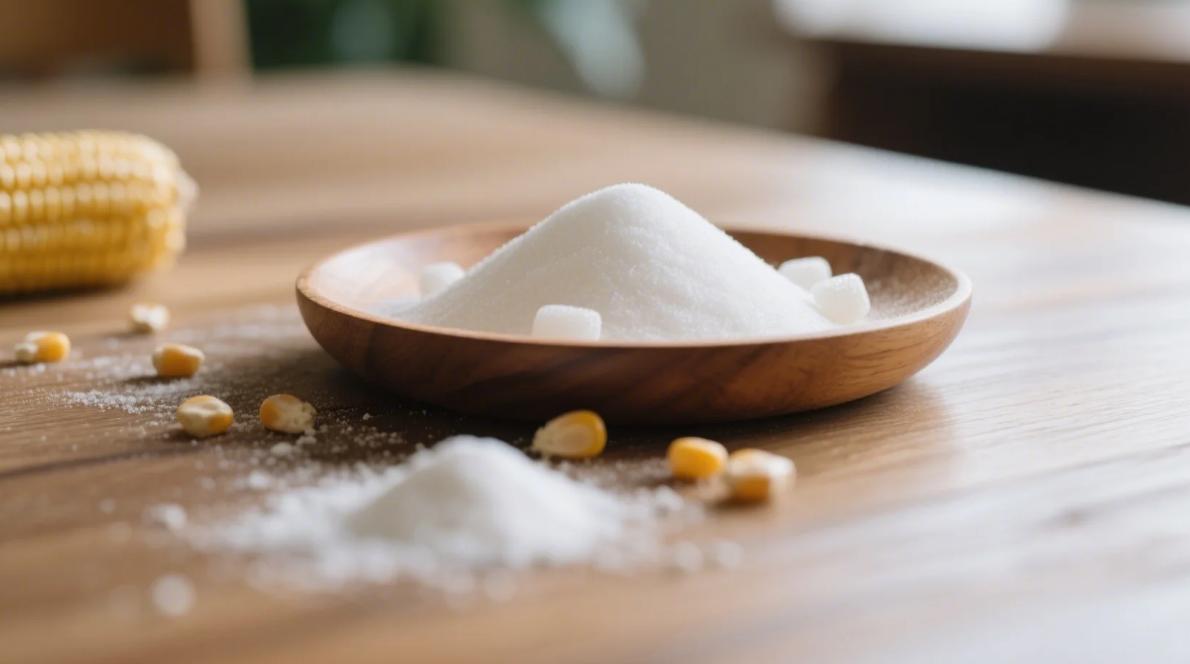The Rise of Clean-Label Energy
In an era where consumers demand transparency and sustainability, organic dextrose is emerging as a cornerstone of clean-label innovation. With global organic food markets growing at 12% annually, this plant-derived carbohydrate is redefining energy solutions across industries. Whether in its anhydrous (water-free) or monohydrate (water-bound) form, organic dextrose offers unparalleled purity, functionality, and environmental stewardship. Let’s explore how these two variants are shaping the future of food, health, and sustainability.

1. What is Organic Dextrose?
1.1 The Science of Simplicity
Organic dextrose, chemically identical to glucose, is derived from non-GMO crops like corn or wheat through enzymatic hydrolysis. Certified organic production ensures no synthetic pesticides, chemical bleaches, or GMOs.
1.2 Two Forms, One Mission
- Organic Dextrose Monohydrate: Contains one water molecule per glucose unit, ideal for moisture retention and stability in baked goods and pharmaceuticals.
- Organic Anhydrous Dextrose: Water-free and ultra-pure, offering rapid dissolution and concentrated energy for sports nutrition and medical applications.
Certifications: USDA Organic, EU Organic, Non-GMO Project Verified, Kosher/Halal.
2. Functional Showdown: Anhydrous vs. Monohydrate
| Property | Organic Dextrose Monohydrate | Organic Anhydrous Dextrose |
|---|---|---|
| Moisture Content | ~8% water, enhances texture in baking | 0% water, ideal for dry blends |
| Dissolution Speed | Moderate (requires hydration) | Instant in cold/hot liquids |
| Energy Density | 3.4 kcal/g | 3.8 kcal/g (higher due to dryness) |
| Pharma Compatibility | Used in tablet binders and syrups | Preferred for IV solutions and injections |
| Cost Efficiency | Lower ($1.2–1.5/kg) | Premium ($2.0–2.5/kg) for purity |
3. Applications: Where Each Shines
3.1 Organic Dextrose Monohydrate
- Baking: Replaces refined sugar in organic breads, enhancing yeast activity and shelf life.
- Confectionery: Prevents crystallization in gummies and caramels while maintaining soft textures.
- Pharmaceuticals: Stabilizes humidity-sensitive tablets and pediatric oral rehydration formulas.
3.2 Organic Anhydrous Dextrose
- Sports Nutrition: Rapid glycogen replenishment in energy gels and isotonic drinks.
- Medical Solutions: Critical in IV drips for hypoglycemia treatment and surgical recovery.
- Functional Foods: Sweetens protein powders without clumping, ideal for keto and diabetic-friendly products.
4. Health & Sustainability Benefits
4.1 Clean Energy, Cleaner Bodies
- Low Osmolarity: Gentle on digestion, making it suitable for infants and medical patients.
- Glycemic Control: Monohydrate’s slower absorption vs. anhydrous’s quick release allows tailored formulations for blood sugar management.
4.2 Planetary Stewardship
- Regenerative Farming: Organic cornfields increase biodiversity by 30% vs. conventional crops.
- Zero-Waste Production: Byproducts like corn husks are upcycled into biogas or livestock feed.
- Carbon-Neutral Processing: Solar-powered facilities reduce emissions by 40% per ton.
5. Market Trends: Why Brands Are Switching
- Clean-Label Demand: 68% of consumers avoid synthetic additives, favoring organic dextrose’s “free-from” profile.
- Functional Food Boom: The global sports nutrition market, valued at $45B in 2024, relies on anhydrous dextrose for rapid energy solutions.
- Pharma Innovation: With 85% of IV solutions now using organic anhydrous dextrose, hospitals prioritize purity to reduce allergic reactions.
6. Success Stories: Pioneering Innovations
6.1 “PureFuel” Energy Bars
- Challenge: Create a vegan, low-GI protein bar without refined sugars.
- Solution: Organic dextrose monohydrate + pea protein.
- Result: 90% 5-star reviews for “moist texture and sustained energy.”
6.2 “GreenMed Pharmaceuticals”
- Innovation: Switched to organic anhydrous dextrose for pediatric IV solutions.
- Impact: Reduced adverse reactions by 50% in clinical trials.
7. The Future: Smart Formulations
- Synbiotic Blends: Dextrose + probiotics for gut-health-enhanced energy products.
- AI-Driven Customization: Apps analyze user metabolism to recommend monohydrate/anhydrous ratios.
- Edible Packaging: Dextrose-based films replace plastic wrappers in organic snacks.
Redefining Energy, One Molecule at a Time
Organic dextrose isn’t just a sweetener—it’s a catalyst for healthier lives and a greener planet. From powering marathon runners with anhydrous precision to nurturing infants with monohydrate gentleness, this dual-formula marvel embodies the future of clean-label innovation. As industries pivot toward transparency and sustainability, organic dextrose stands ready to fuel progress.